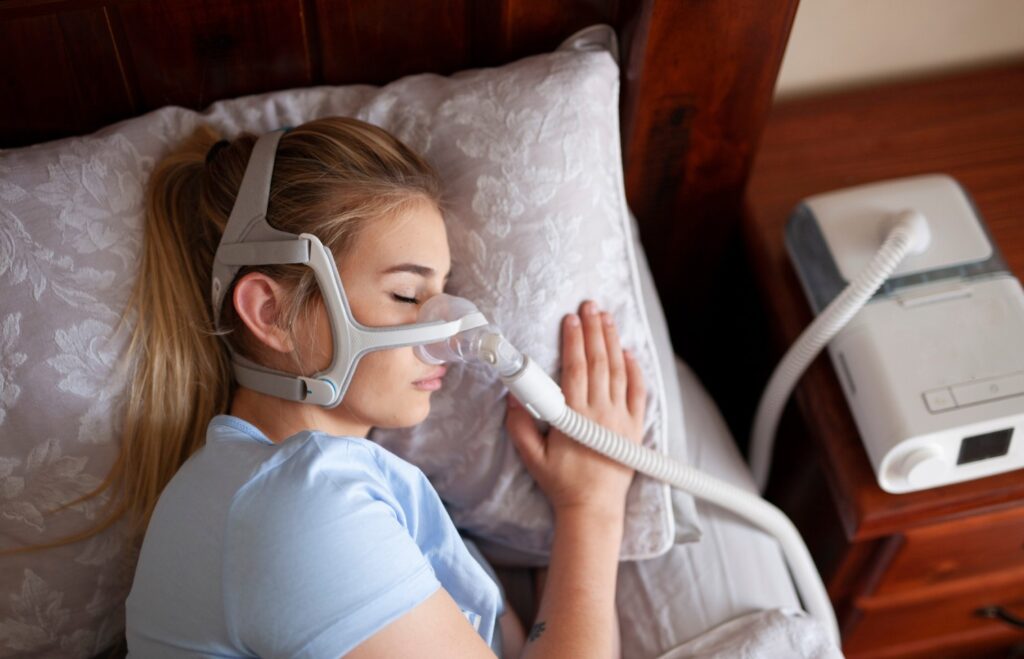Many people associate loud snoring with sleep apnea, but the two are not the same. While both can disrupt sleep, sleep apnea is a serious medical condition that requires attention, whereas snoring is often a minor annoyance. Understanding the differences between the two is essential for maintaining sleep health and overall well-being.
In this article, we’ll explore the causes, symptoms, risks, and treatments for both snoring and sleep apnea, helping you know when to seek professional help.
What Is Snoring?
Snoring occurs when airflow through the mouth and nose is partially obstructed during sleep. This causes the soft tissues in the throat to vibrate, producing the familiar sound.
Common Causes of Snoring
- Nasal congestion: Allergies, colds, or deviated septum
- Throat anatomy: Large tonsils or long uvula
- Lifestyle factors: Alcohol consumption, smoking, or sleeping on your back
- Age: Muscle tone decreases with age, increasing vibration
Snoring is often harmless but can interfere with your partner’s sleep and, in some cases, signal an underlying sleep disorder.
What Is Sleep Apnea?
Sleep apnea is a serious sleep disorder in which breathing repeatedly stops and starts during sleep. It can cause oxygen levels to drop and the body to wake frequently, often without conscious awareness.
Types of Sleep Apnea
- Obstructive Sleep Apnea (OSA): The most common type, caused by a physical blockage of the airway.
- Central Sleep Apnea (CSA): Caused by the brain failing to send proper signals to the muscles that control breathing.
- Complex Sleep Apnea: A combination of OSA and CSA.
Key Differences Between Snoring and Sleep Apnea
| Feature | Snoring | Sleep Apnea |
|---|---|---|
| Breathing interruptions | None | Repeated pauses in breathing |
| Oxygen levels | Normal | Often drops during sleep |
| Daytime fatigue | Mild | Severe, chronic |
| Health risks | Minimal | High risk: heart disease, stroke, diabetes |
| Treatment | Lifestyle changes, nasal strips | CPAP therapy, oral appliances, surgery, lifestyle changes |
While snoring can be a nuisance, sleep apnea has serious health implications if left untreated.
Recognizing Sleep Apnea Symptoms
Unlike simple snoring, sleep apnea symptoms may include:
- Loud, persistent snoring that may include choking or gasping
- Excessive daytime fatigue despite adequate sleep
- Morning headaches
- Difficulty concentrating or memory problems
- Irritability or mood swings
A sleep study (polysomnography) is often required to accurately diagnose sleep apnea and determine severity.
See more : CPAP Therapy for Sleep Apnea: How It Works and What to Expect
Health Risks of Untreated Sleep Apnea
Sleep apnea is more than a sleep problem — it can impact overall health:
- Cardiovascular disease: Increases risk of high blood pressure, heart attack, and stroke
- Diabetes: Affects glucose metabolism
- Weight gain: Poor sleep may affect hormones controlling appetite
- Accidents: Daytime sleepiness increases risk of accidents at work or while driving
Treatment Options for Sleep Apnea
1. CPAP Therapy
The gold standard treatment, CPAP (Continuous Positive Airway Pressure), keeps airways open by providing a steady stream of air.
2. Oral Appliances
Dental devices can reposition the jaw or tongue to prevent airway collapse, often used for mild to moderate cases.
3. Lifestyle Changes
- Lose excess weight
- Sleep on your side instead of your back
- Avoid alcohol and sedatives before bedtime
- Quit smoking
4. Surgery
In severe cases, surgery may be required to remove obstructions or correct anatomical issues.
Snoring Remedies and Prevention
While snoring is less severe, it can still be disruptive. Remedies include:
- Using nasal strips or dilators
- Maintaining a healthy weight
- Sleeping on your side
- Reducing alcohol consumption before bedtime
- Treating nasal allergies or congestion
Real-World Example: Knowing the Difference
Take Sarah, a 38-year-old Sydney resident. She snored loudly for years, assuming it was harmless. Over time, she became increasingly fatigued and experienced morning headaches. After a sleep study, she was diagnosed with moderate obstructive sleep apnea. Using CPAP therapy and adjusting her sleep habits significantly improved her energy, mood, and overall health.
This example shows why differentiating snoring from sleep apnea is essential.

When to See a Sleep Specialist
Consult a professional if you:
- Snore loudly and frequently
- Experience choking, gasping, or pauses in breathing during sleep
- Have severe daytime fatigue
- Suffer from unexplained morning headaches or mood changes
A sleep specialist may recommend a home-based sleep test or an in-lab sleep study to determine the best treatment plan.
Conclusion
While snoring can be an annoying but benign issue, sleep apnea is a serious medical condition that requires attention. Recognizing the symptoms and differences between the two is essential for improving sleep health and preventing long-term health risks.
If you or a loved one experiences persistent snoring combined with daytime fatigue, consulting a sleep specialist and undergoing a sleep study can help you find effective treatment options, from CPAP therapy to lifestyle modifications.




